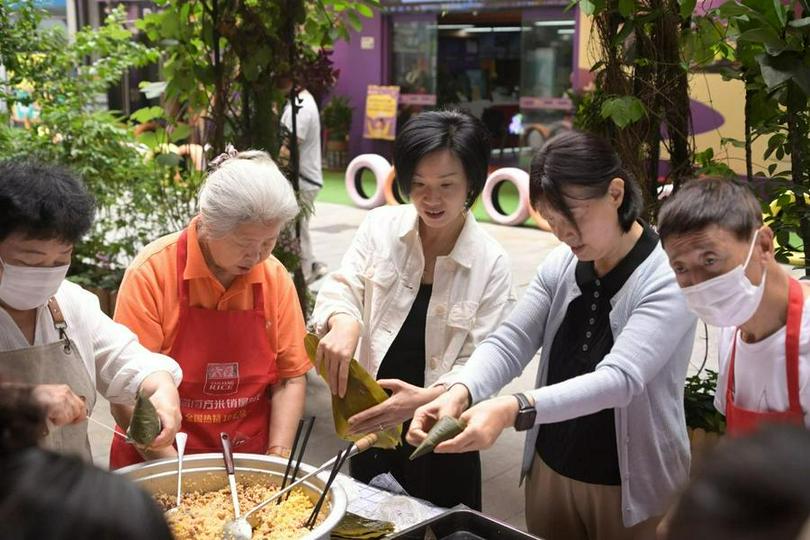On May 27, four churches in Nanshan District, Shenzhen, came together to organize a zongzi (sticky rice dumpling) wrapping event called "Together for Wellness: Dragon Boat Festival of Health & Harmony."
The Dragon Boat Festival, also called the Duanwu Festival, falls on the fifth day of the fifth lunar month in the Chinese calendar (on May 31 this year). People celebrate it to commemorate a great patriotic poet named Yuan Qu by eating zongzi and racing dragon boats.
According to the Shenzhen Nanshan District Church, almost 100 pastoral staff and members from Nanshan Church, Baishizhou Church, Qiaocheng Church, and Meinian Church took part in the event.
The venue was well-stocked with bamboo leaves, sticky rice, various grains, and red dates. Participants engaged in the traditional method of making zongzi, which involved four steps: folding the leaves, filling them with rice, compacting the filling, and then tying them with ropes.
After lunch, the congregation shared stories about the origins of the Dragon Boat Festival and reflected on Qu Yuan's enduring patriotic feelings. Rev. Ye Dongsheng skillfully connected aspects of traditional culture with the Christian faith, citing classic poetry lines such as "Long did I sigh and wipe away my tears, to see my people bowed by griefs and fears," and "Since my heart did love such purity, I would not regret a thousand deaths to die" to highlight Qu Yuan's unwavering patriotic spirit and his deep concern for his homeland. He also provided additional references and traditional customs related to the Dragon Boat Festival.
As the event concluded, the ready zongzi were distributed, and the atmosphere of the venue was filled with warmth and unity.
On May 24, the Guankou gathering point in Yugan County, Jiangxi Province, held a Dragon Boat Festival event titled "Zongzi and Harmony: Celebrating Dragon Boat Traditions."
According to Jiangxi CC&TSPM, Elder Wu Pusheng, who serves as the chairman and president of the Shangrao CC&TSPM as well as the chairman of the Yugan County TSPM, hosted the event. He provided an overview of the traditional Chinese celebration of "Dragon Boat Festival," and highlighted the unique characteristic of Yugan's zongzi known as "zongzi wrapped in colours five." He also offered prayers, expressing his hopes that all church members would have a joyful Dragon Boat Festival.
Following this, a zongzi wrapping competition was held. The church carefully prepared five different fillings: salted duck eggs, ham, red beans, mung beans, and red dates. Utilizing Yugan's traditional method of "zongzi wrapped in colours five," the participants engaged in the activity of wrapping and forming the zongzi.
On May 28, Elder Liu Li from Yushui Church in Xinyu City, Jiangxi Province, led a team of full-time church staff to visit the Ludong community to carry out public welfare activities. They distributed household items to those in need, such as smart rice cookers, electric kettles, anti-slip shower chairs, and electronic thermometers. Some of these items were specifically arranged for elderly individuals and others with limited mobility.
On May 30, in addition to engaging in the customary activity of making zongzi, the members of St. James Church in Yichang, Hubei Province also listened to a sermon, where Rev. Chen Runeng referenced the biblical story of Esther's leadership during a national crisis, motivated by her deep love for her people, which ultimately led to the creation of Purim to remember God's rescue of the Israelites through her efforts. Rev. Chen urged all believers to extend their love not just to God but also to the thousands of fellow countrymen who share the same land with us.
Rev. Chen pointed out that the Dragon Boat Festival holds significant cultural meaning and national sentiments, especially in tribute to the patriotic poet Qu Yuan and in conveying hopes for happiness and wellness. He noted that the festival's principles of national awareness, commitment to justice, and the pursuit of goodness closely align with Christian values of love for everyone, fairness, and harmony. He urged his followers to appreciate and uphold the rich heritage of Chinese culture.
- Translated by Joyce Leung












